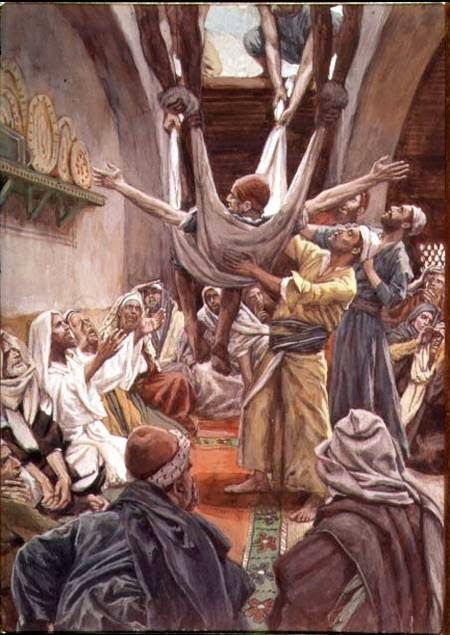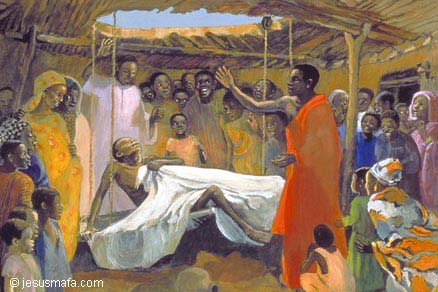Years ago I purchased my first house. It was a 75 year old bungalow made from stone. Over the course of 7 years, the interior of the house was restored to something like what it would have looked in the 1920s. The work included reinstalling a wall so that one very large room was once again two bedrooms. When the wall was rebuilt, closets were included to increase the storage. Not only was the wall build, but the trim work around the doors, the crown molding, and the toe moldings all had to be milled by me to make it look like the millwork from 7 decades before. Some years later I had the opportunity to stop by and ask the current owner if my children could see where they used to live. The host was gracious. The house looked great and it was nice to bring back memories, but one thing was a little irritating. The wall and closets had been removed again. Ugh!
I mention this because I have often thought that the first miracle of Mark Chapter 2 is not the healing of the paralytic, but rather that Jesus does not get mad. Many, many people have heard this tale of four men bringing a paralyzed man on a gurney of some sort to be healed. Kids like the story because the tearing a hole in the roof (literally digging up the roof) is a vivid image. If you are not careful you will miss a little trivia fact in the start of the story. This is Jesus’ home. This is Jesus’ roof!
So, just take a moment and ponder that. Imagine what it would be like to be at home, with…um… the whole town over. They are piling in through the door -some of them are hacking and coughing; some of them have weeping pustules. Some of the people are probably just watching you work and wondering if there is more to drink or something to eat. You are teaching and healing, healing and teaching. You are trapped behind the couch because there is no room left. And then after all of this, four grown men climb up on your roof, dig a hole large enough for a man- a prostrate man- to pass through and they lower him down to you.
And miraculously, Jesus’ reaction is to be impressed with their faith to the point that he does what they ask.
Well, sort of.
What Mark actually tells us is “And Jesus seeing their faith said to the paralytic, “my son, your sins are forgiven.”
This the first of two posts on these 12 verses of Mark. When I started the Hypocritical Christian blog I expected to write a post a week on a single chapter of a book in the Bible. I was probably foolish to think that was possible because there is so much in every passage of scripture that it is impossible to skip over stuff. Not only that, but the Holy Spirit keeps telling me to post more often. I mention this simply to say in this post you may determine that I left out some stuff and you will be right to note I am not covering everything. This post is going to focus on the action of the four men and the revelation that Jesus is “cardiognostes”, the “heart-knower.” The subsequent post will look more directly at the controversy with the scribes with a emphasis on what faith means.
The story is really straightforward. Four friends carry a man to Jesus. They cannot reach him. They go to exceptional lengths to overcome the crowd. Jesus is impressed and pronounces forgiveness. The scribes think to themselves that Jesus is making a claim to do what only God can do. Jesus reads their minds.
Just these 8 verses force me to ask some questions. Can a person experience healing and salvation because of the faith of someone else? Gosh I hope so because Christians do a lot of praying for health.
- When was the last time that you prayed extra hard for some oneelse’s healing?
- When did you last pray for someone whose situation seemed helpless (paralysis is a big deal) with the total conviction that Jesus can make the change happen?
- When was the last time you went the extra mile to bring someone else into the presence of Jesus?
It seems to me that what Jesus sees in the actions of the four men is their resolve not only to help their stricken friend, but that Jesus is the one who can make the difference. It is that latter part that labels what they do as faith versus just desperation. This conviction they have is what makes the difference for their friend.
I have a friend, Paul Burns, who wrote a book called Prayer Encounters. The book grew in part out of his own experience of leading people in life-changing prayers. Paul would say to people that the key to effective prayer is the belief that God can do what is asked. Mark doesn’t record the conversation if any between the four and Jesus. All we get are the actions, but those actions demonstrate that these four believe that Jesus can do something.
Too many Christians pay lip-service to prayer. Too many Christians spend too little time helping those in need get into the presence of the Lord.
In the next post, we will unpack the meaning of faith more fully. For now, consider that Jesus knows what the scribes are thinking in their hearts. We don’t know if that is simply because he sees something in their faces and he intuits their thoughts; or, if he is just straight up reading their minds. The trouble with Jesus is he may be a super-intuitive, smart person and he may just be God and therefore a mind reader. Mark has an answer in mind that we will get to next time. Somehow Jesus knows. What if he knows what you are thinking as well?
Scared?
We all should be.
- Have you been hiding some ill-will towards someone you work with? a spouse? a sibling? the President? the neighbor whose political affiliation is different? the person from a different race? The person poorer or richer than you?
- Do you say one thing to people but “secretly” think another?
- Do you judge others? do you judge self? do you lust? do you rage?
We could make that list go for a long time. I do not write these things to make any of us feel guilty. I write them to say that when we read Mark Chapter 2, we should take seriously the reminder that Jesus knows our hearts. It should remind us that as much as we need God’s healing for the physical things that ail us and as much as we need God’s blessing for the material needs that befall us; we need God’s forgiveness for the sins that plague us.
Ignatius Loyola, the founder of the Jesuits, encouraged his students to spend a few minutes daily doing a personal inventory. The idea was to contemplate the effectiveness of our thoughts and actions with the intent of improving consistently. I invite you in light of the faith demonstrated by the four who carried the paralytic to do some personal inventory. I urge you in light of Jesus’ knack for reading minds to take a moment to consider what is most often on your mind. Perhaps these questions can help:
- When you pray for yourself or others are you convinced that Jesus can answer the prayer? If not, what would it take for you to change your viewpoint (repent) and pray with more conviction?
- Is there someone who needs your help? Is there someone who needs the witness of your faith or actions? If Jesus was watching your actions would he see your faith?
- What secret thought do wish God couldn’t see? When was the last time you confessed to God your sins? Just as importantly, what past sins do you keep apologizing to God because you doubt that He forgave you?
- What is one thing that can be different in your life tomorrow that will move you closer to Jesus?
Just as we all need to pray to Christ with the belief that God can do what we ask, we need to pray to Christ to renew our minds and thoughts because our actions will follow. Faith that heals is faith that trusts.





